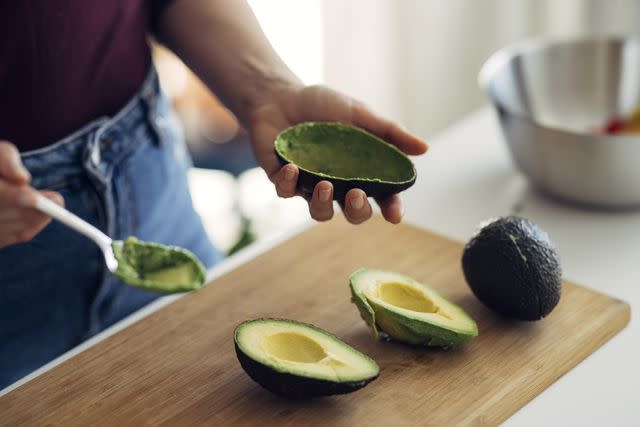Is Avocado a Good Source of Protein?
Nutrients in Avocados
Medically reviewed by Karina Tolentino, RD
Avocados are widely considered to be both delicious and nutritious. But how do they stack up when it comes to your daily protein needs? Avocados do contain protein, but you'd have to eat a lot to hit recommended nutritional goals, and they are high in calories.
This article discusses the protein provided in avocados and how to include them part of a healthy daily diet.

miniseries / Getty Images
How Much Protein Is in Avocado?
Avocados provide important nutrients, but when it comes to protein, they are not champs. Because they are high in calories from carbohydrates and fat, they are not a great source when you're looking for efficient ways to get adequate protein into your diet.
The U.S. Department of Agriculture (USDA) recommends between 34 and 56 grams of protein a day for the average adult male and 34 to 46 grams of protein a day for the average adult female.
Here's a look at the estimated grams (g) of protein in various-sized servings of avocado, along with the estimated calorie count:
Serving size | Protein | Calories |
1 avocado (200 g) | 4.02 g | 320 |
50 g serving (2 ounces) | 1 g | 60 |
1 cup cubed | 3 g | 240 |
1 cup pureed | 4.6 g | 368 |
1 cup sliced | 2.92 g | 234 |
Avocados vary widely in size and weight, so take that into account when calculating your portions and nutrients. For reference, there are 28 grams in 1 ounce.
Does Avocado Provide a Complete Protein?
Avocado is a source of complete protein. A complete protein contains all nine of the essential amino acids that your body does not produce on its own and must get from food. These amino acids are:
Phenylalanine
Threonine
Amino acids are the building blocks of protein. Protein is integral to many of your body's functions, including your immune system, muscle growth, and regulation of mood, hunger, and sleep.
How Can I Pair Protein Foods With Avocado?
While avocado can be a great addition to a nutritious diet, think about pairing it with high-protein foods to hit your recommended protein intake. Here are some food combination ideas to help you do that:
Tuna steak or tuna salad with diced avocado
Chili with avocado as a side or topping
Mixed salad containing avocado, topped with lean meat or fish, and a sprinkle of chopped nuts
Avocado toast with smoked or fresh salmon slices
Avocado toast topped with smashed chickpeas seasoned with lemon and herbs
Tortilla topped with cubed avocado and poached egg
Tortilla with beans and cubed avocado, topped with shredded cheese
Chicken salad with avocado chunks
Shrimp drizzled with lime and topped with sliced avocado
Salad with chopped chicken, crumbled bacon, and avocado chunks
Casserole layered with lean ground beef, corn tortillas, shredded cheese, marinara sauce, and topped with sliced avocado
Other Nutrients in Avocado
Avocados are good sources of important vitamins and minerals. A 50 gram serving, which is about one-third of a medium-sized avocado, delivers the following percentage of daily value (DV) you need, based on a 2,000-calorie-a-day diet:
Potassium: 6% DV
Copper: 10% DV
Folate: 10% DV
Vitamin K: 10% DV
Vitamin B5 : 15% DV
Avocado also contains iron, vitamin C, vitamin E, thiamin, riboflavin, niacin, phosphorus, magnesium, zinc, and manganese. They are high in unsaturated fats, including oleic acid, which are associated with cardiovascular health.
In addition, avocado is a good source of fiber, with about 3 grams of fiber per 50 gram serving, which is about 11% DV.
Summary
Avocados are a healthy food that contain many nutrients and good fat, but they are not an efficient choice when it comes to getting enough protein in your diet, and they are high in calories. Think about pairing avocado with other foods that are high in protein, like lean meat, fish, eggs, nuts, and beans to reach your daily protein goals.
Read the original article on Verywell Health.

